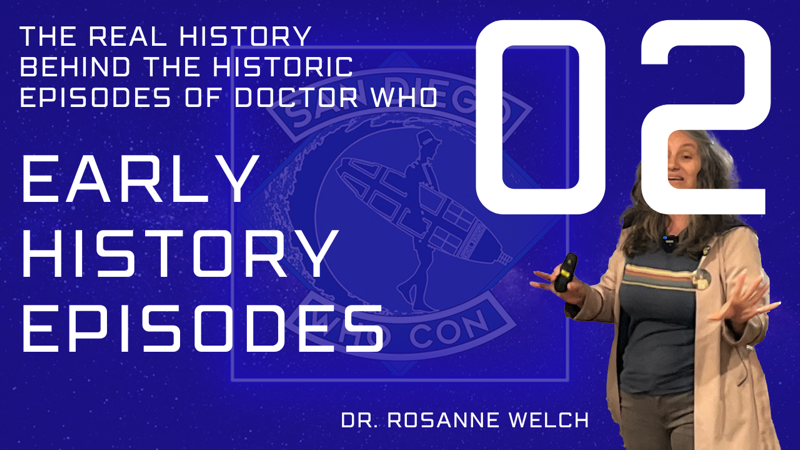In this presentation given at the 2023 San Diego WhoCon I talked about what really happened at Pompeii on volcano day; the agricultural knowledge of the Aztecs; when Robin Hood began appearing in literature, and the bravery of Noor Inayat Khan and Rosa Parks.

What we’re talking about today is the real history behind the history behind Doctor Who. We know from the beginning the show was meant to teach history. It was a children’s program and I think that’s a really lovely idea and so they began with two teachers as companions. That was so intentional and it worked. It was a great way to warm people up and you had to have people who knew something about where they were going. Who had something to say and of course we had a student. You have to have someone you can talk to right? So it was a really lovely blend of characters.The very — one of the earliest ones they did went into the world of the Romans. Everyone’s always fascinated by the Romans and I think what’s really interesting is, sadly, just a little bit later, Highlanders was the last historical one they produced in that early period. They decided it wasn’t what the audience wanted. What did the audience want? Audience:Gimmicks and Robots? Duh, Daleks, right? The Daleks showed up and that was it they were like oh no no this is what the audience is coming for. Forget that history. Forget that study. Don’t learn anything.It’s okay. Also we know that once we get to John Pertwee and he’s trapped on Earth he can’t travel. So there’s no way he’s going to go into the past. So we lose a chunk of time where there was this moment to do something about history and then new Who showed up and we gained it back.
What we’re talking about today is the real history behind the history behind Doctor Who. We know from the beginning the show was meant to teach history. It was a children’s program and I think that’s a really lovely idea and so they began with two teachers as companions. That was so intentional and it worked. It was a great way to warm people up and you had to have people who knew something about where they were going. Who had something to say and of course we had a student. You have to have someone you can talk to right? So it was a really lovely blend of characters.The very — one of the earliest ones they did went into the world of the Romans. Everyone’s always fascinated by the Romans and I think what’s really interesting is, sadly, just a little bit later, Highlanders was the last historical one they produced in that early period. They decided it wasn’t what the audience wanted. What did the audience want? Audience:Gimmicks and Robots? Duh, Daleks, right? The Daleks showed up and that was it they were like oh no no this is what the audience is coming for. Forget that history. Forget that study. Don’t learn anything.It’s okay. Also we know that once we get to John Pertwee and he’s trapped on Earth he can’t travel. So there’s no way he’s going to go into the past. So we lose a chunk of time where there was this moment to do something about history and then new Who showed up and we gained it back.
Watch this entire video

Podcast: Play in new window | Download
Subscribe: RSS




![17 We Stand On The Shoulders…from When Men Forget Women: The Many Ways Male Screenwriters Fail to Mention their Female Colleagues [Video]](https://rosannewelch.com/wp-content/uploads/2022/08/rmw-scms-2021-17.jpg)
![16 Joan Didion & John Gregory Dunne from When Men Forget Women: The Many Ways Male Screenwriters Fail to Mention their Female Colleagues [Video]](https://rosannewelch.com/wp-content/uploads/2022/08/rmw-scms-2021-16.jpg)
![15 Nice Guys and Allies from When Men Forget Women: The Many Ways Male Screenwriters Fail to Mention their Female Colleagues [Video]](https://rosannewelch.com/wp-content/uploads/2022/07/rmw-scms-2021-15.jpg)
![14 Obituaries Are Unreliable Narrators from When Men Forget Women: The Many Ways Male Screenwriters Fail to Mention their Female Colleagues [Video]](https://rosannewelch.com/wp-content/uploads/2022/07/rmw-scms-2021-14.jpg)
![13 Women Writers To Remember from When Men Forget Women: The Many Ways Male Screenwriters Fail to Mention their Female Colleagues [Video]](https://rosannewelch.com/wp-content/uploads/2022/07/rmw-scms-2021-13.jpg)
![12 Photography can be an Unreliable Narrator from When Men Forget Women: The Many Ways Male Screenwriters Fail to Mention their Female Colleagues [Video]](https://rosannewelch.com/wp-content/uploads/2022/07/rmw-scms-2021-12.jpg)
![11 Other Unreliable Narrators from When Men Forget Women: The Many Ways Male Screenwriters Fail to Mention their Female Colleagues [Video]](https://rosannewelch.com/wp-content/uploads/2022/06/rmw-scms-2021-11.jpg)